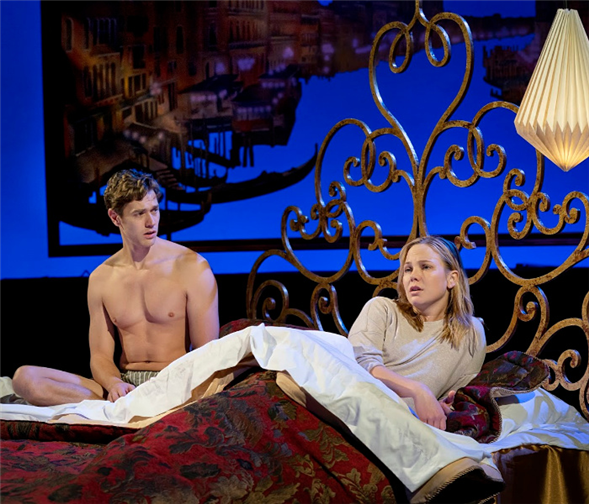Translate Page

The three-time Tony winner on directing the New York premiere of The Hard Problem
---
Parsing the nature of consciousness sounds like a subject for a research think tank, not an Off-Broadway show. But Tom Stoppard has spent his 50-year career crafting dazzling intellectual plays (Travesties, Arcadia, The Coast of Utopia) that distill a wide range of complex topics into witty and stimulating theatre. The 81-year-old British dramatist's latest offering is The Hard Problem at Lincoln Center Theater, about Hilary (Adelaide Clemens), a young research assistant at a neuroscience lab who challenges the establishment orthodoxy that human nature can be completely explained through science. The narrative interweaves mathematical game theory, Darwinian survival, the behavior of the financial markets and the question of the existence of God in an effort to crack the equation of what makes us human.
Heady stuff for sure, but, according to director Jack O'Brien, audiences shouldn't be intimidated. "It's lucid and as easily absorbed as anything I have ever done," he insists. "There are actually two plays going on: There is the intellectual play about this woman and her job, which is engaging and thrilling as it always is with Tom. And then there's this silent play underneath the surface, a story about a missing baby and what that does to a human being," he explains, referencing the infant a teenage Hilary put up for adoption. "Nobody talks about it, but it's there all night long. So, as I said to the company, it is in the silences that we have to do our work."
During his half century in the theatre, O'Brien has helmed both crowd-pleasing musicals (Hairspray, which snagged him a Tony) and Shakespeare (another Tony for Henry IV). He also directed three Stoppard works for Lincoln Center Theater in the past: Hapgood, The Invention of Love and the three-part epic The Coast of Utopia (which earned him a third Tony). "What I know of this man, whom I adore, is his warmth, his humanity and his sensuality," O'Brien says of the playwright. "He's not just a brain. As a matter of fact, he is quite a remarkable collection of appetites. And that has to do with emotion, passion, sex, innuendo."
That's why O'Brien's stagings of Stoppard always skillfully expose the beating heart of each play. "I don't want to tilt with him intellectually," the director says. "Either the play makes me laugh or makes me cry. If I have one or the other response, I know I can do it."
Before plumbing Stoppard's emotional depths, however, the director says it's imperative to pay attention to his words. In fact, O'Brien reports that Stoppard insists on hearing his dialogue exactly as written, particularly for The Hard Problem, a one-act that runs a brisk 90 minutes, a rarity for the playwright. "He has an accumulative effect as a writer. If the words come out correctly, the audience can add it up," O'Brien explains. "Words in the play like 'good,' 'coincidence,' 'miracle,' -- the way he repeats them as they fall down the page into other people's mouths -- they take on a glowing energy that a longer play couldn't supply. And this is not by accident. It's exquisite work, like Tiffany jewelry. He is setting these words in a very specific carapace for us to get their full value in different aspects."
Over their many collaborations, O'Brien and Stoppard have forged a close working relationship, but the director admits they "inevitably lock horns" somewhere in the course of rehearsals. "He has great appreciation of what we do -- all of us who do his work -- and he is incredibly grateful in a genuinely humble way," O'Brien says. "But he's not that interested in the aesthetic process. He's immediately suspicious of anything I do that is theatrical, because he feels that it is dumbing him down. It is all to do with him hearing and understanding the words. Once you get past that you are fine. He's absolutely arrested by the emotional content of The Hard Problem because I don't think anybody has tapped it before."
The play leaves the audience with more questions than answers. But even as it cleverly leads us through cerebral conundrums, it inspires complex feelings. And that's how O'Brien likes it. He points to a moment in the play when Hilary is asked whether she believes in God. In her response, she says, 'Everyone should say a prayer every day, anyway, for who you love, just because it puts them in your diary.' "It's an extraordinary thought," O'Brien marvels. "I think that moves me more than almost anything in the play."
To read about a student's experience at The Hard Problem, check out this post on TDF's sister site SEEN.
---
Gerard Raymond is an arts journalist based in New York City.
Chris O'Shea and Adelaide Clemens in The Hard Problem. Photos by Paul Kolnik.
TDF MEMBERS: Go here to browse our latest discounts for dance, theatre and concerts.